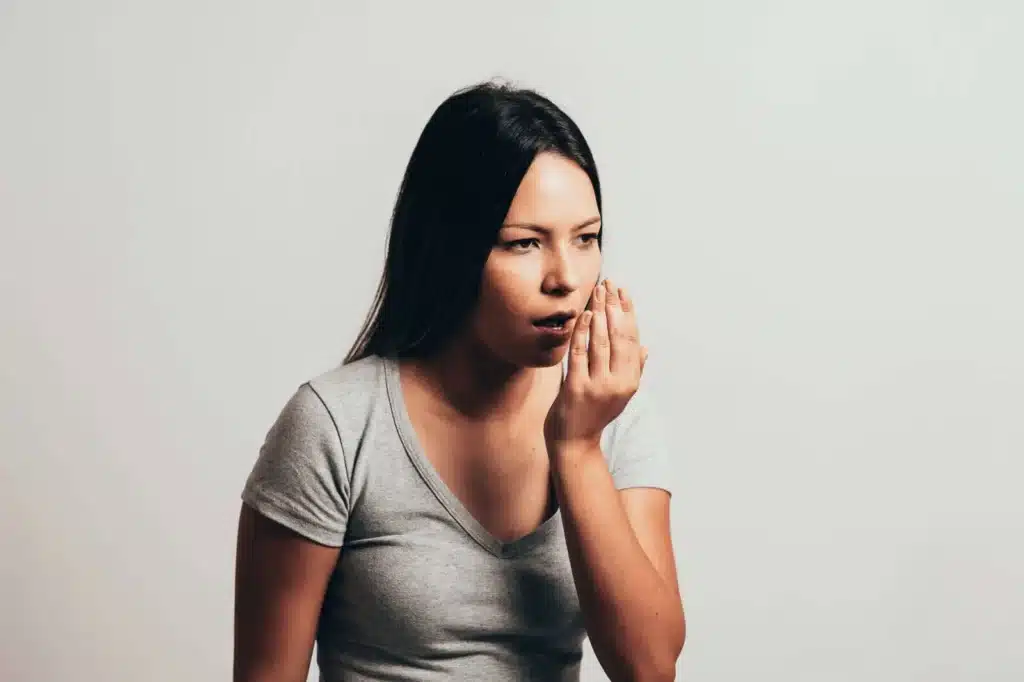Worried about the unpleasant breath of your mouth? Don’t worry. Here’s the solution to eliminate halitosis and better your oral health.
Causes of Halitosis
Bad Breath, or halitosis, can be attributed to various factors. It often stems from odor-causing bacteria in the mouth, which can accumulate due to poor oral hygiene practices. Studies indicate that in approximately 85-90% of cases, the oral cavity is the primary contributor to halitosis.
The warm and humid environment, with temperatures up to 37°C, provides favorable conditions for bacterial growth. Explore the numerous factors that can contribute to halitosis and gain a better understanding of this common issue.
Intraoral Cause
Poor Oral Hygiene
Neglecting regular brushing and flossing allows bacteria to thrive in the mouth, accumulating plaque. When left unaddressed, plaque emits an unpleasant odor, contributing to halitosis.
Periodontal Disease
Conditions like gingivitis and periodontitis can generate oral malodor, often characterized by a distinct putrid smell. Additionally, certain oral conditions can produce foul odors.
Other Intraoral Causes: Improper tongue cleaning, dry mouth, dental caries (cavities), and food lodged between teeth are other factors that can contribute to halitosis. Addressing these intraoral causes helps combat the issue of unpleasant breath.
Extraoral Causes
Most bad breath cases are related to oral factors, but approximately 10-20% stem from non-oral causes. Infections, respiratory tract infections, gastrointestinal diseases, and diabetes are among the factors that can contribute to bad breath.
Medications
Certain medications, such as acetaminophen and antihistamines, can indirectly lead to bad breath by causing dry mouth.

Diseases
Various diseases, including gastrointestinal, endocrinologic, and metabolic disorders, can also be underlying causes of bad breath.
Other contributing factors may include alcohol consumption and smoking. Considering these non-oral factors is essential when addressing and managing lousy breath.
How to get rid of Bad Breath?
Maintain Good Oral Health
To get rid of bad breath, maintain good oral hygiene, brush your teeth, and floss at least twice daily to prevent plaque buildup.
Stay Hydrated
Stay well-hydrated throughout the day, as a dry mouth can lead to bad breath, and proper hydration aids in the production of saliva, which helps keep your mouth clean and helps you get rid of bad breath.
Use Prebiotics
Incorporate probiotics into your diet to restore a balanced intestinal flora, which can contribute to bad breath.
Eat Fruits
Consider consuming fruits such as apples and oranges as they stimulate saliva production, further supporting oral health.

Rinse Your Mouth After Meals
After meals, it is important to rinse your mouth to remove any food particles that may have become trapped between your teeth, as they can contribute to bad breath.
Quit Smoking
Quitting smoking is highly advised to eliminate bad breath, as it leads to plaque buildup and gum diseases and causes bad breath.
By kicking this habit, you can maintain better overall oral health. Make it a habit to see your dentist regularly for check-ups and professional teeth cleaning, which is crucial for maintaining good oral health.
Conclusion
Following the solutions, you can eliminate halitosis and maintain healthy oral hygiene and confidence to create a beautiful smile. Also, you must visit your dentist on a regular basis to avoid any potential harm to your oral he


